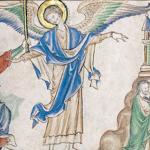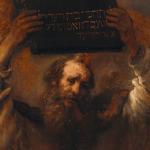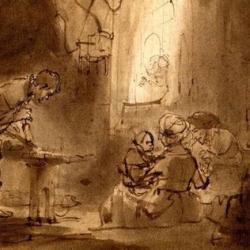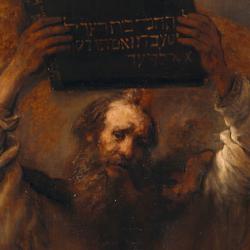The Fourth Word begins with: “Memorialize the day of ceasing to sanctify it.”
I’m using the verb “memorialize” or “commemorate” rather than “remember.” It’s not a command to “call to mind.” Of course, Israel isn’t to forget. But it wouldn’t be enough for Israel to call the Sabbath to mind without actually practicing the Sabbath.
The Fourth Word is a command about a set of practices, certain things that Israel is supposed to do or not do. It’s like the Lord’s Supper: Do this as My memorial.
“Memorialize” is linked to the idea that the Sabbath is a sign between Yahweh and Israel. The first “sign” in the Bible is the sign of the rainbow, and it’s linked to memory, Yahweh’s memory. Yahweh places the bow in the cloud to be a memorial of His promise. When He sees the bow, He will remember and keep His covenant with Noah and the creation.
Passover too is a “sign,” this time an enacted sign done by human beings, to memorialize the exodus and call on Yahweh to keep delivering Israel from all Egypts. It’s a reminder to Israel, but it’s also a memorial before Yahweh.
The Sabbath has the same character. Israel is to keep the day of ceasing to memorialize creation and exodus. It’s a reminder to Israel of the Lord’s actions, but also a memorial between Yahweh and Israel. When Israel keeps Sabbath, they remind Yahweh of His covenant with them, an enacted reminder to Yahweh to bring creation to its fulfillment.
They are to memorialize the day of ceasing, memorialize by ceasing. That’s the meaning of the Hebrew word shabat. They are to memorialize or commemorate the day by ceasing.
The First Word instructs Israel to have no other gods before the face of Yahweh, the God who brought them from Egypt. They are to worship Him alone. The Second Word prohibits worship through images, and the third speaks of bearing Yahweh’s name.
All these have to do with worship. But by themselves, they don’t require that worship and acknowledgement of God intervene in the day-to-day lives of Israelites. By commanding a commemoration of ceasing, the Lord inserts worship into the pattern of Israel’s life.
Work is good; human dominion over the world is good; but God requires that we interrupt (Barth) our work to acknowledge Him as Lord, to acknowledge that our authority is a derived authority (Hirsch). Israel keeps Sabbath to renounce trust in his own work and to confess his trust in God.
This dimension of the Sabbath is made dramatically in its first introduction in Exodus, the first explicit statement of human Sabbath-keeping. It occurs in Exodus 16, when the Lord provides manna for Israel. They are to collect for six days but refrain on the Sabbath. They have to trust that God will provide each day; none is to be left over for the next day. And they are to trust the Lord to provide Sabbath bread, enough bread on the sixth day to cover the seventh.
Ceasing from the work of bread-gathering on the Sabbath was a confession of the inadequacy of human labor; it was a confession of faith in God’s provision. When Israel entered the land, manna ceased, but Israel continued to keep Sabbath. It continued to be a confession that bread from the earth, as much as angel-bread from heaven, was a gift of God, not a sheer product of human labor.
Keeping Sabbath expressed the fundamental stance of Israel toward Yahweh, a stance of receptivity. Keeping Sabbath was a way of confessing God as God, and Israel as his dependent son.















